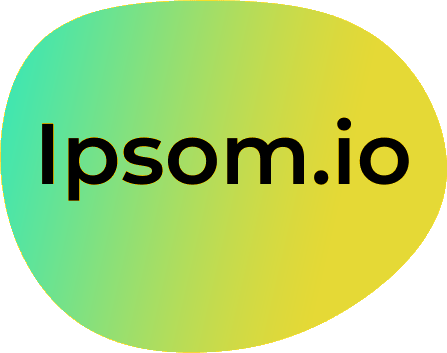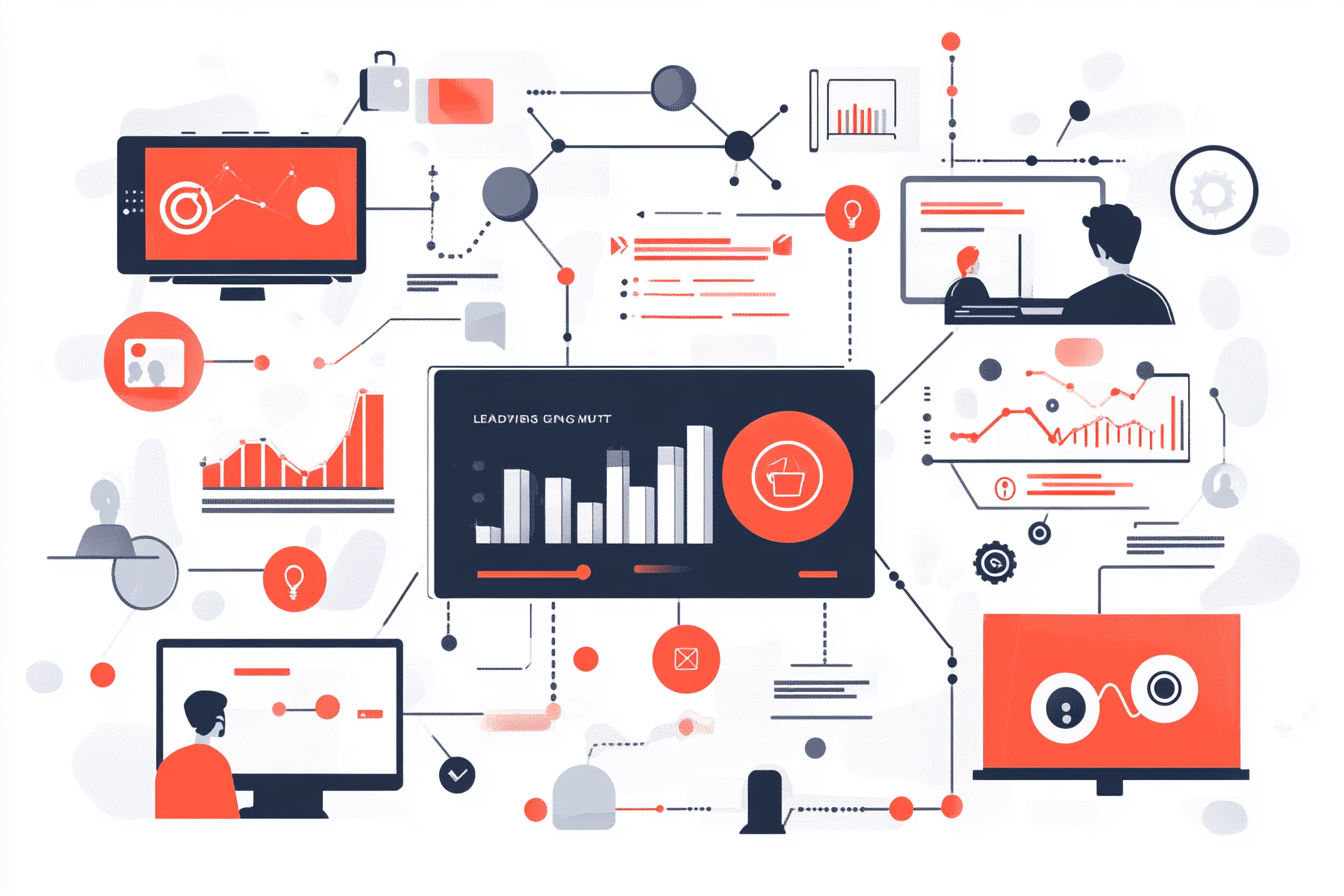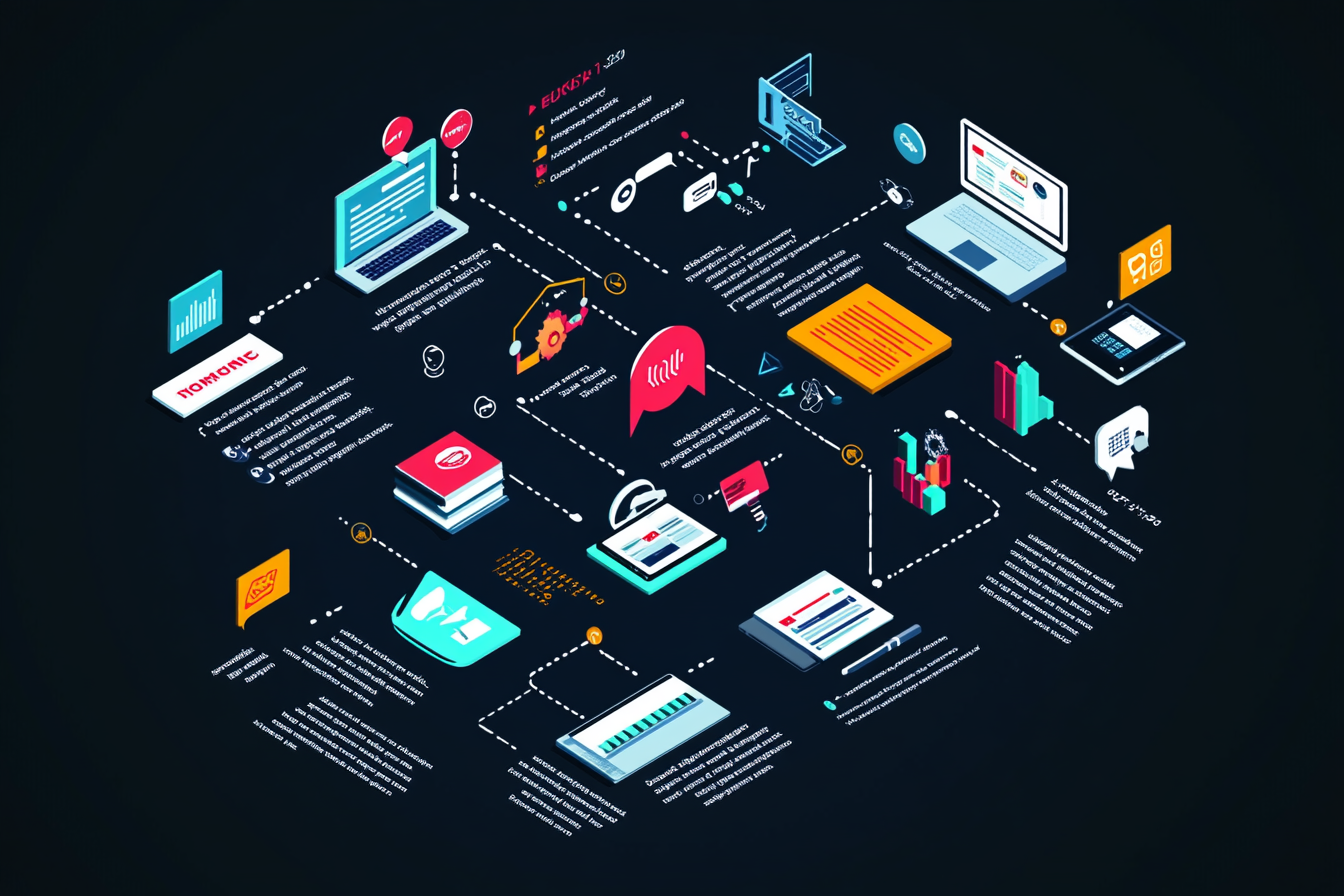Effective digital marketing automation is pivotal in modern marketing strategies, as it streamlines tasks, enhances customer experiences, and drives lead generation. By utilizing various tools designed to automate workflow and maximize efficiency, marketing teams can focus on developing effective strategies.
Key Takeaways
- Definition of Digital Marketing Automation: Digital marketing automation refers to the use of software to automate repetitive marketing tasks across various digital channels.
- Key Benefits: Increased efficiency, personalized customer experiences, streamlined workflows, and unified customer interactions.
- Common Tools: Brevo, HubSpot, Omnisend, ActiveCampaign, Klaviyo, Customer.io, Ortto, Mailchimp, with each having distinct features and suitability for different business types.
- Evaluation Criteria: Consider automation capabilities, integration options, pricing, ease of use, and reporting analytics when choosing a tool.
- Challenges: Businesses often struggle with data utilization, lead generation, and customer engagement, which marketing automation can effectively address.
Explore expert insights on marketing automation and improve your strategies at ipsom.io.
Understanding Digital Marketing Automation
Digital marketing automation simplifies the process of managing marketing tasks. It uses software to handle repetitive tasks and streamline workflows. This enables marketing teams to focus on strategizing and implementing campaigns that drive results.
Definition and Purpose
Digital marketing automation refers to using software to automate tasks across various digital channels. Its main goals are to enhance efficiency, provide personalized experiences, and support customer engagement. By automating processes, businesses can save time and create more relevant interactions with their audience.
Key Features of Marketing Automation
Effective marketing automation tools come with essential features. They include multi-channel capabilities, allowing outreach through email, SMS, and social media. Customizable workflows enable teams to tailor campaigns to meet diverse goals. Additionally, integration with existing CRM and CMS systems is essential for a seamless experience. These features ensure that businesses can engage customers effectively while optimizing their marketing efforts.
Common Marketing Automation Tools
Choosing the right marketing automation tool is essential for effective execution. Several popular options cater to different business needs, each with distinct features.
Overview of Popular Tools
- Brevo: This is an affordable all-in-one solution that includes CRM, SMS, and WhatsApp automation, suitable for small businesses.
- HubSpot: A premium platform packed with extensive features. However, its cost can be higher, making it more suitable for larger companies.
- Omnisend: Designed specifically for eCommerce, this budget-friendly tool offers robust features for email and SMS marketing.
- ActiveCampaign: A comprehensive suite that includes AI tools and supports multilingual workflows, ideal for diverse markets.
- Klaviyo: Known for its user-friendly interface and strong focus on eCommerce businesses, making it easy to set up and use.
- Customer.io: Offers powerful automation features, though it typically comes at a higher cost compared to others.
- Ortto: A modular automation tool with detailed reporting capabilities, though it's on the pricier side.
- Mailchimp: A widely recognized tool for email automation, with robust integrations across various applications.
Evaluation Criteria for Tools
When evaluating tools, consider several critical factors:
- Automation Capabilities: Ensure the tool can automate multiple marketing channels effectively.
- Integrations and Functionality: Look for seamless connections with other platforms you currently use.
- Price to Value: Compare pricing to ensure it fits within your budget, especially for small to medium-sized businesses.
- Ease of Use: Choose a tool with a user-friendly interface and readily available customer support.
- Reporting and Analytics: Opt for platforms that provide in-depth analytics and customizable dashboards to track performance effectively.
By selecting the right tool, businesses can amplify their marketing efforts and streamline their processes for greater efficiency.
Advantages of Digital Marketing Automation
Digital marketing automation offers significant advantages that can transform how businesses engage with customers and manage their marketing efforts. By automating tasks and processes, companies can achieve better efficiency and deliver more personalized experiences.
Increased Efficiency
- Primary Benefit: Increased efficiency in marketing operations.
- Automation of Repetitive Tasks:
- Email Marketing: Automates the distribution of campaigns, freeing up time for strategy.
- Social Media Posting: Schedules and manages posts, reducing manual effort.
- Focus on Strategy and Creativity: Marketing teams can prioritize innovative approaches over mundane operations.
- Streamlined Collaborative Processes: Automation enhances teamwork by simplifying workflows.
Enhanced Customer Personalization
- Creation of Personalized Workflows: Cater to individual customer behavior and preferences.
- Tailored Marketing Messages: Ensure messages resonate with target audiences.
- Improved Targeting: Deliver the right content at the right time, meeting customer needs effectively.
- Foster Customer Loyalty and Engagement: Personalized experiences increase the likelihood of conversions.
Unified Customer Interactions
- Centralized Data Management: Facilitates efficient task prioritization and management.
- Cohesive Data Tracking: Allows businesses to monitor and manage customer journeys across multiple channels.
- Enhanced Customer Experience: Provides a seamless and integrated interaction, strengthening relationships.
- Boosted Customer Satisfaction: Unified interactions contribute to a more satisfying overall experience.
Challenges in Digital Marketing Automation
Despite the clear benefits, many businesses encounter challenges with digital marketing automation. Identifying and addressing these issues is vital for successful implementation.
Common Business Struggles
One of the primary struggles is effective lead generation. Many marketing teams find it difficult to reach the right audience and draw in potential customers. This can stem from inadequate targeting strategies or insufficient engagement techniques.
Another significant challenge is maintaining consistent customer engagement. Customers interact with brands across multiple touchpoints. It can be hard to ensure cohesive interactions that keep them interested and involved.
Additionally, businesses often grapple with the proper utilization of massive data sets accumulated from various marketing activities. With so much information available, understanding how to analyze and act on this data is essential.
Overcoming Challenges with Automation
Digital marketing automation effectively addresses these challenges. By streamlining tasks, it reduces the workload on marketing teams. Automation also enhances data utilization, allowing businesses to analyze customer behavior and preferences effectively.
Furthermore, personalized marketing strategies can be facilitated through automation tools. By leveraging automation, companies can engage customers in a tailored manner, improving their overall experience and fostering loyalty. Dispatching the right messages to the right audience at the right time becomes easier, ultimately enhancing both lead generation and customer engagement.
Integration with Existing Systems
Integration is vital for maximizing the impact of digital marketing automation. Effective integration with existing CRM and CMS systems creates a seamless flow of data and enhances workflows. When marketing automation tools can connect smoothly with these platforms, they enable more efficient data management and task coordination.
Importance of Integration
The importance of integration cannot be overstated. It allows for better data sharing across various marketing channels. Using tools like Zapier, businesses can automate repetitive tasks without manual input, saving time and reducing errors. This seamless flow enhances overall productivity and lets marketing teams focus on strategy rather than routine tasks.
Additionally, integration improves the tracking of customer journeys. When tools communicate effectively, marketing teams can analyze customer interactions across platforms. This capacity leads to better insights, more targeted campaigns, and ultimately higher conversion rates. Strong integration ensures that all aspects of marketing work harmoniously together, driving greater success.
Future Trends and Technologies
The landscape of digital marketing automation is rapidly evolving, driven by advancements in technology and shifts in consumer behavior. Staying ahead of these trends will be crucial for businesses aiming to enhance their marketing strategies.
The Role of Artificial Intelligence
Artificial Intelligence (AI) plays a significant role in shaping the future of digital marketing automation. Recent advancements in AI have enhanced capabilities such as predictive analytics and personalized marketing. AI algorithms analyze vast amounts of data to identify patterns and predict future customer actions, allowing businesses to tailor their marketing efforts accordingly. Utilizing AI can help automate workflows, optimize campaign management, and create highly targeted, effective marketing strategies that resonate with customers.
Importance of Free Trials
Many modern marketing automation platforms offer free trials, giving businesses an opportunity to test functionalities before committing financially. This feature allows users to explore the tools and assess their suitability for specific marketing strategies. Utilizing free trials can lead to better-informed decisions, ensuring that the chosen automation solutions align with business goals and specific requirements.
Embracing these trends will position businesses to leverage the full potential of digital marketing automation, driving growth and efficiency.
Conclusion: Choosing an Automation Tool
Choosing the right automation tool is critical for your business's success. Start by assessing your current needs. Consider how the tool can fulfill your immediate requirements. Also, think about your future growth potential. The right tool should evolve with your business.
Evaluate the tool's specifications and user experiences. Look for features that align with your marketing goals. Read reviews and get feedback from current users. This will help you understand the tool's strengths and weaknesses.
Be mindful of integration capabilities. Ensure the tool can seamlessly connect with your existing systems, such as your CRM. This will enhance your marketing efforts and streamline processes.
By carefully analyzing these factors, you can find the best fit for your business's automation needs. Effective automation can transform your marketing strategy and drive growth.
FAQ
What is digital marketing automation?
Digital marketing automation is the use of software to automate repetitive marketing tasks across various digital channels. It helps in improving efficiency and enhancing customer experiences.
How can marketing automation improve customer engagement?
Marketing automation personalizes customer interactions and delivers targeted content, improving engagement. It allows businesses to respond to customer behavior in real time.
What are the most popular digital marketing automation tools?
Popular tools include Brevo, HubSpot, Omnisend, ActiveCampaign, Klaviyo, Customer.io, Ortto, and Mailchimp. Each tool offers unique features tailored to different business needs.
What criteria should I consider when evaluating marketing automation software?
Consider automation capabilities, integration options, pricing, ease of use, and the quality of reporting analytics. These factors help you select the right tool for your business.
Can I integrate marketing automation with my existing CRM system?
Yes, most marketing automation tools support integration with existing CRM systems, enhancing data sharing and improving workflow efficiencies.
How does pricing work for marketing automation platforms?
Pricing varies based on the features offered and the size of your business. Most platforms have tiered pricing structures with options suitable for small to medium-sized businesses.
Is training required to use digital marketing automation tools effectively?
While not always necessary, training can help users maximize tool functionality. Many platforms offer resources, tutorials, and customer support to assist users.
What future trends should I be aware of in marketing automation?
Stay informed about advancements in artificial intelligence and predictive analytics. These technologies are enhancing automation capabilities and personalizing marketing efforts.
How do I measure the effectiveness of my marketing automation strategy?
Effectiveness can be measured through key performance indicators (KPIs) such as increased engagement rates, lead conversion rates, and improved customer retention. Regularly analyze these metrics to evaluate your strategy's impact.






